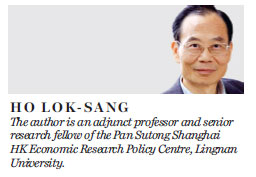Housing proposal may not work
Updated: 2015-11-17 07:50
By Ho Lok-Sang(HK Edition)
|
|||||||
Ho Lok-sang argues that while the Our Hong Kong Foundation's public housing scheme has great intentions, in practice it may fail to deal with the city's housing problems
The think tank Our Hong Kong Foundation (OHKF) has proposed an ambitious public housing rent-or-purchase scheme. OHKF claims it will help lift the home ownership rate to 80 percent and make home ownership accessible to more Hong Kong people. I applaud both goals, but suspect that the proposed land cost repayment method - with the repayment set at the land value during the time of purchase - may not alleviate Hong Kong's severe housing problem at all.
According to the proposal, a flat with a market price of HK$4 million could be sold to a qualified Hong Kong family at half price, or HK$2 million. An aspiring would-be homeowner need only pay a HK$100,000 down payment. The discount from the current market price reflects unpaid land costs. Unlike the current Home Ownership Scheme (HOS) housing, which requires homeowners to repay the unpaid land costs at current market values, the OHKF proposal would fix the repayment at the historical cost - that is, even if land value should go up fourfold, the repayments will remain unchanged. The OHKF proposal even provides that if housing prices fall and land costs decline, the repayment can be reduced. So the home buyer has the potential to gain, but is protected from a loss.
Because of favorable provisions in the scheme, many would-be tenants will decide to purchase a flat. So the proposal will lift the home ownership rate. This can be regarded as a benefit. I agree that if society has more homeowners it is likely to be more stable.
However, the proposal is likely to aggravate the housing problem rather than alleviate it. It will also result in other serious consequences which the government should be aware of.
First, when a public flat is purchased, it becomes out of reach to prospective qualified tenants. These people will have to wait longer because the scheme will attract more applicants and because the owner has the incentive to sit on his flat for a longer period before repaying the land premium. If land values rise along with inflation, sitting on the flat for a longer period means repaying the unpaid land cost at lower real cost. So the incentive to sit and wait cannot be dismissed.
Second, the scheme by itself does not increase the supply of housing. Unless housing supply is increased, the alleged benefit of facilitating land cost repayment will do nothing to increase entry level housing supply, even if the homeowner did not "sit and wait", as I explained above, to gain from inflation. We have to understand that at any given time there are also private homeowners who want to sell their homes and move on to better ones. This trading-up activity is conditional on there being better flats for them to buy. Given that supply is not increased, when a public housing owner realizes a bigger equity selling his home and repaying only the historical land cost, to the extent that he succeeds in trading up, he is preempting the private flat owner who wants to do the same. So overall there will not be any net increase in entry level homes even if homeowners under the OHKF scheme decide to trade up. When these public flats are eventually sold at market prices, they are no longer available for households in the target group which the government originally wanted to help.
Another problem that could arise, one that economist Andy Kwan Cheuk-chiu has mentioned, is that the availability of flats sold at half the market price could shake up the private housing market. We need to remember that what currently sustains the private market is essentially users who are not wealthy but who have amassed help from other family members. These people would most probably qualify for the OHKF scheme. With such an attractive scheme available, many buyers would disappear, triggering a major decline in the prices of smaller homes. The resulting redistribution of wealth could be very unfair.
I am even more worried about the erosion of Hong Kong's spirit of self-reliance. The traditional HOS scheme has been effective and serving Hong Kong well for decades. Although land cost repayment cases have not been numerous, the total repayment is not insignificant either - typically totaling hundreds of millions of dollars per year. The fact that many HOS owners continue to live where they were many years ago does not mean it is inefficient. If they are enjoying a stable, happy life why should anyone complain? An online survey that I conducted in 2011 showed that among all tenure types, families living in HOS housing were the happiest.
Indeed, the current HOS housing can be sold at any time without land cost repayment to "green form" applicants, who typically are public rental housing tenants, and "white form" applicants. The alleged involuntary "locking up" of wealth because land cost repayments are too high is actually a red herring. I prefer requiring the resale of flats to target groups rather than forcing people to endure years of waiting. The former promotes what I call "policy efficiency". We want precious resources to be used to help those in the target group. If the resale price is lower than otherwise, then so be it.

(HK Edition 11/17/2015 page9)